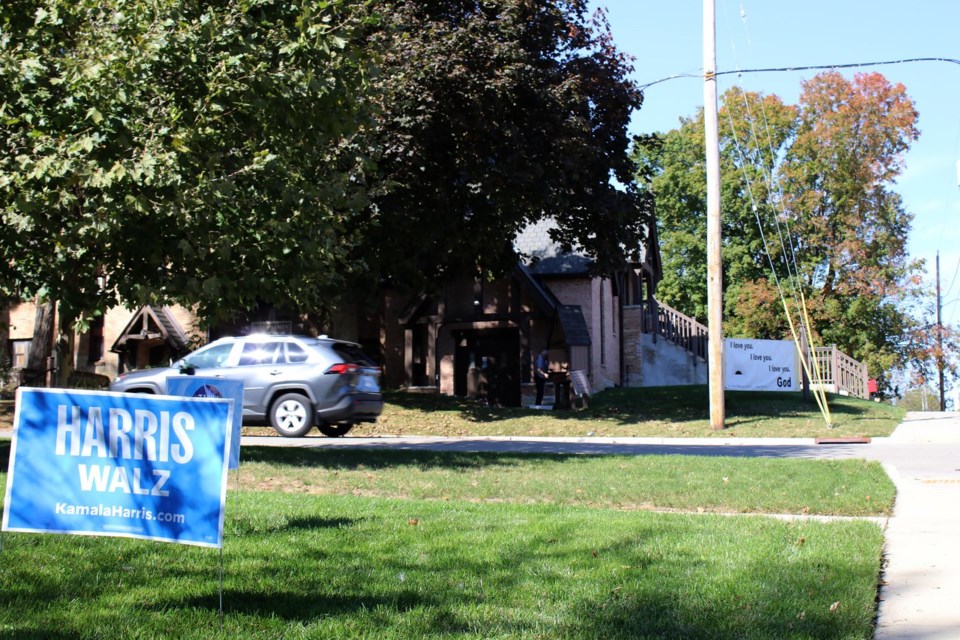WEST BEND — Mary Herrick has lived in Washington County, just outside of Milwaukee, for 50 years but during a recent lunch with a close friend there was an uncomfortable moment: Herrick said she was going to vote for Vice-President Kamala Harris and her friend said she would be voting for former president Donald Trump.
"I think my jaw probably hit the floor," Herrick, 76, said in a recent interview from her home in West End.
The upcoming election has caused relationships to fracture as Americans deal with intensifying political polarization. The division, heightened by social media echo chambers, has spilled into friend groups and families where political ideology is pushing people apart.
"I just couldn't say anything," Herrick said about how the conversation with her friend ended. "I just don't understand why people would vote for him."
The country's two major parties sit at virtual parity. About half of registered voters, 49 per cent, lean toward the Democratic party, while 48 per cent identify as Republicans, according to the Pew Research Center.
Political parties used to be ideologically heterogeneous, said the University of Pennsylvania's Marc Trussler, meaning their membership included people with a range of different priorities. But over the last 12 years, party support has become more sorted by ideology or world view.
The result: elections feel much more existential, he said, and it becomes easier to fundamentally dislike the other side.
"It's increasingly the case that, 'People like me are in my political party and people not like me are in the other political party'," said Trussler, director of data science for the university's program on opinion research and election studies.
Political division is particularly stark in Wisconsin, an important battleground state that could prove crucial to deciding the November election.
A neighbour stopped by to talk to Herrick on recent warm afternoon. Pointing to the Kamala Harris sign in her yard, the neighbour laughed and said she could vote for those communists, referencing an often-used Trump attack about the vice-president. Unfazed by her neighbour's remark, Herrick reflected on what was behind her decision in the election.
"Maybe my choice shouldn't be made this way but … Trump as a person, I just don't like him," Herrick said.
Trump took Wisconsin in 2016 by less than a percentage point. President Joe Biden narrowly edged ahead in 2020, helping him take the White House.
The state has seen its political division play out in numerous ways beyond the presidential ticket. Until very recent changes, Wisconsin was considered one of the most gerrymandered states in the U.S., formerly with a "Swiss cheese" appearance to its electoral maps.
Its senators, conservative Republican Ron Johnson and liberal Democrat Tammy Baldwin, could not be further apart on nearly every core issue. It's also where Scott Walker was the controversial Republican governor, bringing in a law that ended nearly all collective bargaining in the state until he was replaced by Democrat Tony Evers in 2019.
A large Trump flag waves in the wind outside Donna Hass' house as the 65-year-old talked about crime and immigrants. Her county is considered one of most red in Wisconsin, and on social media she only uses Truth Social, a media platform owned by Trump.
"I have one son that doesn't like to talk to me because he's a lefty," Hass said. "It's horrible. You can't even talk to your own kid and that's just because of all the rhetoric."
A recent Marquette Law School survey in Wisconsin found 46 per cent of people polled had stopped talking to someone about politics because of the presidential race.
Trump has exacerbated the division, said Allison Prasch, an associate professor at the University of Wisconsin-Madison. The former president's powerful use of language galvanizes his base through fear, emotional appeals, and by tapping into anger and rage, she said.
"You see individuals responding very strongly in response to Trump," the expert on U.S. presidential rhetoric said. "Whether that is moving toward a love and affiliation for him or being motivated by a deep hatred for him."
Race, income and the rural-urban divide are some of the most important predictors of voting behaviour. Madison and Milwaukee, and some of their surrounding suburbs, lean Democrat while the rest of the state largely leans Republican.
College education is an important voting predictor. At Marquette University during a break from class, Chase Harris said sometimes it feels like "it’s Milwaukee versus the entire state."
Sydney Tepley said people are too focused on the personal aspects of the candidates and it means there are not enough conversations about their policies and vision for the future of America.
“The long story short: the cost of living, inflation and taxes,” she said.
Tepley and Harris, nurses who are updating their training to become anesthetists, say it feels like the most pivotal election for their futures. But they are disheartened by what has taken place during the tumultuous campaign. Both intend to vote but are begrudgingly casting their ballot.
"I think I have an idea of where I lie," Harris said. "But I will tell you for the first time ever I don't want to vote for either of them."
This report by The Canadian Press was first published Oct. 13, 2024.
— With files from The Associated Press
Kelly Geraldine Malone, The Canadian Press
